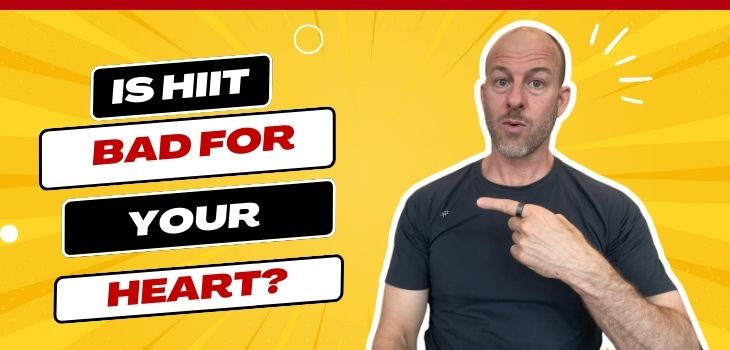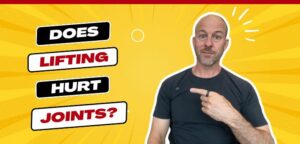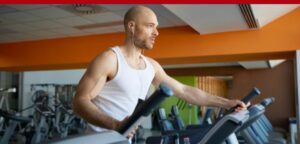by Ted Ryce
Ted Talk 221: Is HIIT Training Bad For Your Heart? - Ask Ted
by Ted Ryce
by Ted Ryce
Ted Talk 221: Is HIIT Training Bad For Your Heart? - Ask Ted
Ted Talk 221: Is HIIT Training Bad For Your Heart? - Ask Ted
more
by Ted Ryce
Ted Talk 221: Is HIIT Training Bad For Your Heart? - Ask Ted
If you are overweight or obese, with concerns about plaque buildup in your arteries, you might wonder if high-intensity interval training (HIIT) is a safe and effective option for you, or not.
In this episode, Ted answers the question: “Is high-intensity interval training (HIIT) dangerous for overweight or obese individuals with plaque in their arteries?”
He breaks down a study that shows HIIT can shrink coronary plaques in patients with stable coronary artery disease. He also highlights contraindications for high-intensity exercise testing, provides practical tips for implementing HIIT safely and more. Listen now!
You’ll learn:
- Reader’s question: Is HIIT safe for people with heart conditions?
- The science behind HIIT and heart health
- Study breakdown: “High Intensity Interval Training and Coronary Plaque”
- The risks and contraindications of HIIT and how to address them
- Practical advice for implementing HIIT safely
- The importance of HIIT for longevity
- And much more…
Related Episodes:
498: Everything You Need To Know About High Intensity Interval Training HIIT with Ted Ryce
Ask Ted 95: Why HIIT Workouts Can Injure You (If You’re Not Ready)
Ask Ted 94: Cardio Vs HIIT, Best Multivitamin and More
Links Mentioned:
Watch our Body Breakthrough Masterclass
Schedule a 15 mins strategy call
Learn more about our success stories
Ready to make 2024 your best year ever?
We just opened spots for our Unstoppable After 40 Coaching Program.
Together, we’ll craft a personalized plan to reclaim your health and transform your body in a way that fits your busy lifestyle.
If you want to learn more about our program, click here!
We have limited spots, so click here to book a call now!
Podcast Transcription: Ask Ted: Is HIIT Training Bad For Your Heart?
Ted Ryce: Welcome back to another Ask Ted episode. In today's episode, we're gonna be answering the question, is high intensity interval training dangerous if you're overweight or obese?
So if that's something you're concerned about, if you're overweight, if you're obese, if you've been told that you have some buildup of plaque in your arteries, or perhaps you're just concerned you haven't had a diagnosis or a doctor tell you you have plaque in your arteries, but you're concerned you might based on your lifestyle and perhaps family history, we're gonna dive into that today so you're in the right place.
What is up my friend and welcome to the Legendary Life podcast. I'm your host Ted Ryce. We put on this show for two reasons. One is so that you get the best evidence –based information on fat loss and long -term health optimization on the internet. And the second reason is if you are a high performer, if you are that executive or entrepreneur and you want to take away the guesswork and speed up the results with your health and you want to have as much success there as you have in other areas of your life, you'll know who to hire.
So let's dive right in. Now this question comes to me from a newsletter reader.
And the question goes like this. “Hello, Ted. Thanks for the email. Would a person with plaque in their arteries risk having a heart attack if they were undertaking hiit? I think overweight or obese people struggle with that worry. They may want to get fit, but worry about stressing their hearts. I would appreciate your thoughts on this. Your readers might enjoy clarity on this. Best regards, James.”
Thanks, James. Thanks so much for this question. And thank you for trusting me enough to answer this in a way that is going to be safe. It really means a lot. And by the way, if you're not subscribed to my newsletter, go to LegendaryLivePodcast .com, my website, and sign up for it if you want to get stories that I share there that I don't share here and as well as sharing, I share an exercise of the week and some other stuff.
So you actually get a video of how to do an exercise and I explain to you why and how to do it. So make sure you go there. So let's get back to this question. And I wanna tell you something.
I wanna start off with this. I've been in this business for 25 years. I've worked with a lot of people with heart disease and you also have to be careful who you ask this question to, who you get advice from. Because someone might, well, they might answer it wrong. They might tell you to do something unsafe. And what I wanna do here is, first of all, I'm gonna tell you, I'm not gonna pretend to be a doctor or a cardiologist more specifically.
I'm gonna tell you right off the bat, this is a conversation you wanna have with your doctor or your cardiologist more specifically if you have one. And I also want to say to this that your doctor unfortunately might be too busy figuring out how to charge clients with the insurance and how to get reimbursed and seeing so many clients and you know, or maybe caught up there in their own ego that they're not quite up on the latest research on this. So things to keep in mind.
So I'm not gonna be answering this from the perspective like I'm trying to pretend to be a doctor. What I did was I went and looked this up because we're in this unbelievable time that if you wanna know the answer to something, we don't have to guess, we don't have to worry so much, we can see have there been studies done to test this very exact thing?
Do people with plaques in their arteries have a higher risk of having a heart attack if they're doing high -intensity interval training? And with that, let's go to the studies.
The first study I want to share with you is from 2023. It's from the European Journal of Preventive Cardiology, and the title is “High intensity interval training induces beneficial effects on coronary atheromatous plaques.” Now I might be ruining that word there. A randomized controlled trial. Atheromatous, I've never seen that before. Anyway, this is the study, by the way, if you listen to my conversation with Gerald Carvalho.
This is the study that he mentioned where high intensity interval training shrunk coronary plaque.
So right away we know that if you have stable coronary artery disease, that you're probably fine. Now probably life is a risk.
It's a risk not to do anything, not to address your heart disease aggressively. And it's also a risk to address it aggressively. Me personally, I want to get into the best shape possible. It's going to improve my life. Even if I had coronary artery disease, I would want to focus on living the best life I could.
We know that VO2 max, which high intensity interval training improves more than slow steady state cardio. We know that it improves VO2 max better, more efficaciously, more effectively than steady state cardio. So that's something we know.
And in this study, what they did was they got, a group of people, 60 patients, they're randomized to two sessions of weekly supervised hit at 85 to 95 % of their heart rate. And what happened? Well, they did it for six months, so two times weeks, six months. And what they said is, what they found was in these patients with established coronary artery disease, a regression of atheroma volume, in other words, the plaque volume, shrunk.
Now it's not huge, it's not gonna replace a statin, but it is significant. And I'm not gonna get into the question of statins. To be honest, it's not a topic, it's a topic I ask other people about, because I don't feel qualified enough to go and get into the, I try to stay away from the medications.
And try not to ever get on medications for that matter. So what I'll tell you is if you have coronary artery disease and it's stable, this is telling you that not only is high intensity interval training safe, but it can shrink the plaques.
There you go. However, I said, I used a word that's very important, stable, because what I also found is that there are some issues. For example, if we go to, I went and looked at the exercise testing contraindications in the journal Circulation by the American Heart Association and what they said is that you need to watch out for certain people.
So this is for exercise testing not high -intensity interval training, but still the exercise testing is quite intense so what they said was: Absolute contraindications of doing high -intensity exercise testing, again this isn't on high -intensity interval training, but doing like exercise testing if you had a heart attack within two days. Oh my gosh. Imagine someone wanting to do some intense exercise testing after a day or two of having a heart attack. Ongoing unstable angina. So angina is that pain in the chest that comes on with exertion. Uncontrolled cardiac arrhythmia with hemodynamic compromise. What is that? Don't really know.
I know what the arrhythmia is, of course, but hemodynamic compromise. That's why you need doctors. Of course, we could Google that and find it out, but again, what are the implications at a deep level? You'd want an expert. You wouldn't wanna talk to Dr. Google. That's my personal opinion, of course.
Active endocarditis, symptomatic severe aortic stenosis, decompensated heart failure, heart failure is the other heart disease that doesn't get talked about enough. Most people don't even know about it, including myself, until my dad had heart failure. Acute pulmonary embolism, pulmonary infarction, or deep vein thrombosis. Acute, again, that's acute. That means like you currently have pulmonary embolism, pulmonary infarction, or deep vein thrombosis.
You didn't wear the stockings on that long flight back from Europe, I guess, acute myocarditis or pericarditis. So in other words, I don't want to put you to sleep reading with you listening to me stumble through trying to pronounce these medical terms. But the point is there's certain things that are contraindicated.
That's when, if you have any of this, this is when you really want to talk to your cardiologist and really weigh the pros and cons of doing high intensity interval training. All right, you wanna weigh the pros and cons. You don't want to just take, no, definitely don't do it for an answer. You're like, well, what are the pros and cons here?
And at the end, in a few minutes, let's say, I'm gonna get into some practical implications of how to implement high -intensity interval training in your program so that you, regardless of whether you have coronary plaque or not, you don't make a mistake because you could, you don't have to have coronary artery disease to have an issue with exercise. So I'm gonna talk about how I approach this with clients. So you wanna stay until the end and I'll go over that.
So what we're learning so far is that it's not only safe but extremely beneficial for people with diagnosed but stable coronary artery disease and that there's some contraindications where certain people need to really talk to their doctor. Of course, if you have one of these questions, by the way, don't ask me.
I've had people ask me highly medical questions and it's just like that. You really need to talk about it with your doctor. I mean, I can't help. If you've had multiple surgeries and then you're struggling with something, it's like, you know, I'm probably not the person to help you, okay?
But this question where it's something I can help with. So let me just talk about a few things. So if I had, let's say I had a client come to me, they had some coronary artery disease, by the way, I do have clients like that and have had clients like that. What we do is this, number one, medical evaluation. Don't sleep on your doctor's appointment.
Look. I know it's part of the narrative to kind of slam doctors and mainstream medical care, and I get it. I have my own issues with the medical system and a personal level. I get it. But that is not a reason not to go get checkups. It's just they're gonna come from a particular perspective, just like I'm gonna come from a particular perspective. I don't wanna take drugs. I try to get people off of medications if they happen to be on them.
Of course, for lifestyle, things that can be dealt with with lifestyle. So understand that your doctor is gonna provide valuable insight, but they're also gonna have a bias, just like I have a bias. My bias is sleep, exercise, nutrition, supplementation, regenerative medicine, stress management, okay? That's my bias.
And then the second thing is professional guidance. I've worked with healthcare professionals to develop a tailored exercise program for a client. I will say this though, the thing that you want to focus on is getting in better and better shape because that's going to help you long -term. And if your doctor's not on board with that, man, he better have a really good reason why, or she better have a really good reason why.
And it can't be because, well, it's just safer that way and I don't want to do the research. It's like find a new doctor if you're not getting good advice. All right. Three, gradual introduction. So if you're okay with HIIT training, let's say you've had that medical evaluation, you've been given some parameters to start, but you're okay with HIIT training.
You don't have to do the Norwegian four by four, which is four minutes of HIIT training with three minutes of rest repeated four times. You can start with 10 second intervals, 20 second, 30 seconds, 40, are you with me?
There doesn't need to be, you don't need to follow one of these protocols at all although they're good. My point is that you can start with shorter intervals and gradually increase as you go.
And the other thing is keep a close eye on symptoms. Look, if you're having chest pain, but you wanna finish your four minute interval because you're doing the Norwegian protocol, stop.
If you're short of, well, if you're short of breath, you're gonna be huffing and puffing when you do high intensity interval training, you're gonna be huffing and puffing, but if you experience anything negative, stop. So, are you taking away, what are you taking away here?
I would say the big things are this. Number one, if you are stable, if you don't have heart disease, get into HIIT training so you don't, so you lessen your chances or you slow the progression of heart disease if you end up getting it. Most of us will get it.
If you're not being perfect with your diet, most of us will get it. Diet and exercise and sleep, et cetera. Not just diet, by the way. Most of us will get it. Most of us will die from it.
So this is something that you wanna focus on because raising your VO2 max is one of those things. It helps with everything. And the second thing is if you are higher risk, have a medical evaluation, get a checkup.
If you're 40 plus, get one of those, get a stress test, an ultrasound stress test, an echo, sorry, stress test. Have your heart, have a thorough checkup.
Please don't be one of those people who takes their car in anytime that it has a problem, but you don't take yourself in to get maintenance. Please don't be that person.
And I've had many clients who they came to me. I was like, when's your last checkup? Oh, it's been like five years. I'm like, you need to get your ass into the doctor and get a checkup? We can talk about what they say if they want to put you on medication or something like that, but you need to get your ass in there seriously.
And then, make sure you have professional guidance to set things up. If you're in a really tight situation with your health and you want a medical professional, maybe you need cardiac rehabilitation or work with someone like me if you're not in a really high risk situation.
And of course, gradual introduction, start with lower intensities, shorter intervals and work up. There's no need to follow any specific protocol, and again, pay attention to those symptoms.
So I wanna give you a few final thoughts here. HIIT training, more specifically raising your VO2 max is the way to go. Everybody's talking about, or I say everybody, but so many people are talking about supplements and other things and it's saunas and cold plunges.
Look, that stuff is great, but it's really the tip of the iceberg. The foundation are things like, okay, am I a functional person because I'm doing some type of resistance training to maintain my joint range of motion, muscle strength, joint integrity?
And then we're talking about VO2 max. And really VO2 max is probably the number one longevity metric if we're talking about which one has the most evidence behind it. And what we also know is that HIIT training your VO2 max better than every other type of exercise. So if that's true, it's something that should be your goal.
And if your doctor doesn't want you to do it, you better have, or she better have a damn good reason. Like, hey, no, listen, here's your specific situation. If you do this, you're gonna die. You're gonna have a heart attack. They should have a really, but if it's just like, if you got a little bit of plaque in your heart, well guess what? We have evidence showing it reverses it.
So this is what you do to not get heart disease or to try to reverse it. But I want to say one more thing here. If you're over 65, then you really need to pay attention. You probably aren't behind on your doctor's appointments. Hopefully that's the case at least. There is more risk and you need to make sure that you're okay with those risks.
For me, I want to be in great shape because life isn't worth living if I'm not doing that, okay? That's how I live my life. Of course, if something happened to me, I ended up in a wheelchair, I'd figure it out, but I'm not in that situation. I'm in a place where I'm good, so I want to be in great shape. That's why I went and got stem cell injections in my joints so I could keep up higher-intensity exercise.
And there's one other thing I wanna say here for those of you who are, you know, you don't have any heart disease and you're not over 65, maybe you're in your 30s, 40s, this is something you wanna get on now.
There's an idea that you can just get in shape later and it's not like that. You can lose fat, you can improve muscle mass and improve your cardiovascular fitness later.
But if we're talking about things that are building up now like coronary artery disease, what we've been discussing, it starts building up when you're young. We're talking about a lifetime of exposure throughout your entire lifetime.
How high was your cholesterol? How much exercise did you do? How healthy were you? So we're talking about a lifetime risk. Don't sleep on this, get on it. And the best part is it takes less time than you think. But you must make time for yourself. You must prioritize yourself. You must have enough self respect and self discipline and dare I say self love to take care of yourself.
But, if you're a person and people are relying on you. It's your duty to be at the top of your game. And your health, if it's going in the wrong direction, it will eventually stop you. Because you might tell me, well, health isn't the most important thing. My family is.
I get why you'd say that, and I understand. But the problem is, your family is gonna be taking care of you, and you're gonna be stressing them out because of your poor health.
Your family sees you going in the wrong direction, and I guarantee you that it's not helping them. Even if you're paying the bill, you're protecting, providing, bringing home the bacon, if you will, the Canadian bacon because it's lower in fat.
And this is something that you want to get on. I care about you a lot. And I know there's people who really care about you because they depend on you. You have a close relationship with them. This is something that you want to start ASAP.
All right, that's it for me today. I hope this answered your question. I hope it gave you some perspective and I hope you listen and take action on it because that is what is missing right now. Too much analysis, too much overthinking. If you're worried about it, go get a checkup. If you're low risk, you had a checkup recently, just start doing HIIT training and start light.
But stop thinking, start acting. That's all I have to leave you with. Hope you have a great one. Talk to you soon.
Sign up to receive email updates
Enter your name and email address below and I'll send you periodic updates about the podcast.









